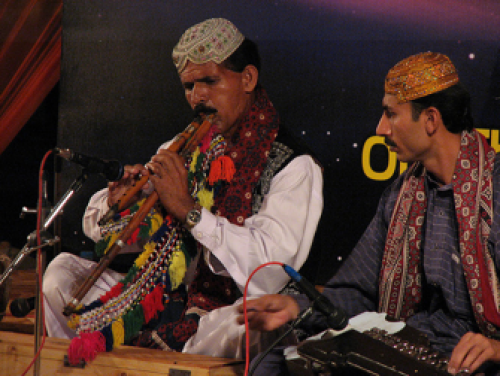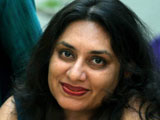Theater of the Repressed
by Bina Shah / January 22, 2013 / No comments
Though the arts are returning to Pakistan, their almost twenty-year absence has directly contributed to the lack of tolerance in the country.

Pakistani artists, who were often repressed during General Muhammad Zia ul-Haq’s rule, play at a Sindhi musical event in 2008. Photo: Rehman Chughtai, Flickr.
Though Pakistani-American actor Faran Tahir recently came to Karachi to speak about his life and work in Hollywood, it was his degree in Developmental Studies from the University of California, Berkeley that caught my attention. While studying at UC Berkeley Tahir married his love for theatre with his interest in business and economics to analyze how theater takes on different expressions in the developing world, where, as he put it, “the choices for actors are much easier.”

- Pakistan is a country of contradictions – full of promise for growth, modernity and progress, yet shrouded by political, social and cultural issues that undermine its quest for identity and integrity. My bi-monthly column “Pakistan Unveiled” presents stories that showcase the Pakistani struggle for freedom of expression, an end to censorship, and a more open and balanced society.

- Bina Shah is a Karachi-based journalist and fiction writer and has taught writing at the university level. She is the author of four novels and two collections of short stories. She is a columnist for two major English-language newspapers in Pakistan, The Dawn and The Express Tribune, and she has contributed to international newspapers including The Independent, The Guardian, and The International Herald Tribune. She is an alumnus of the International Writers Workshop (IWP 2011).
At UC Berkeley Tahir wrote his thesis on how different genres of theater developed in response to the silencing of the people’s voices and artistic expression under dictatorships and repressive governments. In his words, “When there is the imposition of religion, politics, or racial hatred, what becomes the artistic avenue to get the truth out?”
Three countries served as case studies in Tahir’s examination of how theater developed in reaction to government censorship.
During General Muhammaed Ali Zia ul-Haq’s military dictatorship in Pakistan, improvisational street theater emerged as a way for playwrights to convey political messages to the common man and woman. However, this also negatively affected the actors, as they did not learn how to work with proper scripts. In Poland, due to the Soviet government’s repression, masked theater became a way for actors to protect their identity during performances. In South Africa, under the apartheid system, folk theater addressed social issues by couching them in retellings of the country’s rich mythology, history, and culture.
Listening to Tahir reminded me of growing up in Zia’s Pakistan of the 1980s—the cultural and artistic repression was extreme. Actors struggled as theaters refused to let them perform on stage; concerts were thought to promote obscenity; artists who painted nudes were considered worse than heroin dealers; classical dancers were unable to earn a living and had to emigrate.
The nation’s only entertainment came in the form of religious songs, sung either by a qawali, an excitable chorus of Sufi singers who sat on the floor and banged away at traditional instruments, or a single melancholy man who often ended up sobbing hysterically to show the measure of his devotion to God. If this sounds like an absurd description, it’s because those times were absurd, with the government force-feeding piety to a people who had no appetite for it.
Today, Pakistan is a much freer nation, and its cultural life has been limping back to normality, but its history of cultural repression has had terrible effects. The arts, as Tahir said when talking about acting, allow us to feel empathy toward humanity. Inversely, if there is no art, we are not able to connect with the experiences that can move our souls and brighten our spirits. But the almost twenty-year absence of the arts in Pakistan has done worse than this; it has directly contributed to the growing lack of tolerance for minorities, women, and anyone else perceived as “the other” in the country.
In Pakistan people often talk about how improving education will reduce the stranglehold of terrorism on society, but I firmly believe it is the proliferation of the arts—supported by government grants, private sponsorship, and generous philanthropy—that will do the most for promoting peace and tolerance. The softening of Pakistan’s spiritual center through theater, visual arts, music, dance and song, and literature is easily achieved: Let the people find their voices once again.




